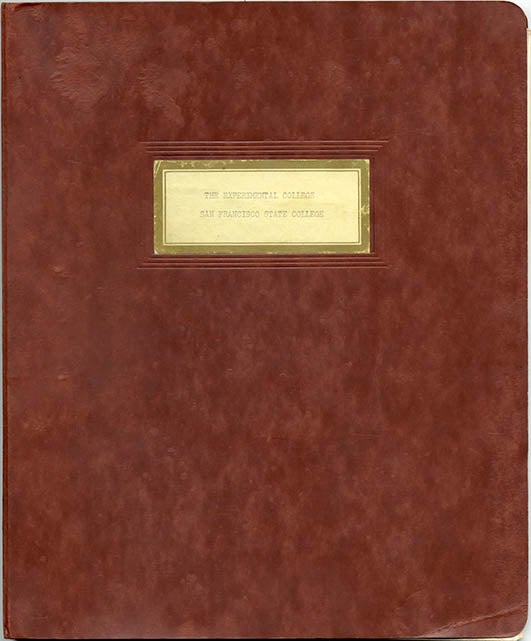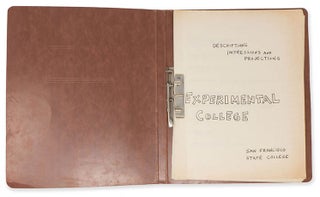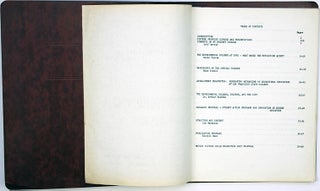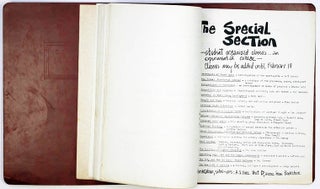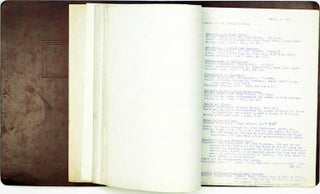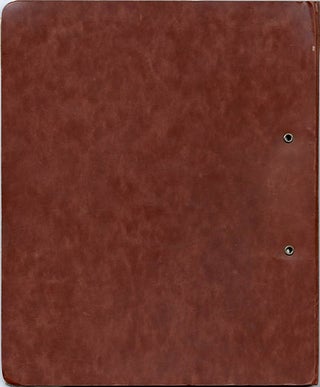16.
THE EXPERIMENTAL COLLEGE. Experimental College: Descriptions, Impressions and Projections (San Francisco State College, c. May 1966).
4to. A grouping of mimeographed leaves, printed rectos only, some in aniline purple, bound with a metal clasp into a pressboard cover with typed label to upper panel. The table of contents cites 40pp., although pp.22-27 (“The Experimental College, Culture, and the City” by Dr. Arthur Bierman) and pp.28-30 (“Research Proposal - Student Action Programs and Innovation in Higher Education”) are lacking. However, there are a variety of supplemental documents bound in, totalling 14pp., including “Course Descriptions for ‘The Special Section’ (Experimental College)”, “Notes on the Experimental College”, and “Some Notes on the Special College”, making the total pagination count 45pp. + title page + contents page.
OCLC shows only one record for this title, held at New York State Library, with 39 leaves, suggesting both its rarity and the likelihood that collation varied.
The Experimental College at SF State was started in Fall 1965 (it was formally established in Spring 1966) by a group of students, among them Cynthia Carlson, Russell Bass and Michael Vozick, many of whom had been engaged in the Civil Rights Movement. Influenced by the Cuban Revolution and The Free Speech Movement across the Bay in Berkeley, and (probably) named after Alexander Meiklejohn’s Experimental College at the University of Wisconsin in the 1920s, the organisers believed that students should take control over of their own education and create a model for revolution.
One of their first decisions was to hire Paul Goodman, author of “Growing Up Absurd” and co-author of “Gestalt Therapy”, as their visiting professor. Another tutor was Jeff Berner, who taught an avant-garde art history course called “Astronauts of Inner Space” (alongside his weekly column of the same name for the Sunday San Francisco Chronicle/Examiner). Berner provides the introduction to this volume, as well as two further texts, “Sixteen Proposed Courses and Presentations” and “Comments on My Present Course.”
Other contributors include Karen Duncan (“The Experimental College at SFSC - What Makes the Revolution Quiet?”); Mike Powell (“Background on the Special College”); Joe Barankin (“Structure and Content”); Russell Bass (“Publication Proposal”); and an anonymously written text titled “Development Prospectus: Developing Mechanisms of Educational Innovation at San Francisco State College.”
Operating out of three jerry-built huts on the SF State campus, 1000 students enrolled in the Experimental College’s 70 courses. As well as those run by Paul Goodman and Jeff Berner, these ranged from topics such as “Perspectives of Revolution”, “Competition and Violence”, and “Personal Development” to “Black Nationalism” and a Black Studies programme (the first in the USA), making it the largest department on campus. The seminars, which took place in the evening, were free and taught by both students and members of SF State’s faculty, and unlike most other Free Universities, college credit was offered for most courses.
The Experimental College also organised and co-sponsored Stewart Brand’s three-day benefit for the college, held at SF State between September 30 and October 2, 1966. Called “Whatever It Is”, the multimedia event featured the last legal Acid Test (shortly before LSD was criminalised) and the participation of, among others, Ken Kesey and the Merry Pranksters, the Grateful Dead, Mimi Fariña, Anna Halprin and the Dancers Workshop, Ron Boise and his sound sculptures, and, as with Brand’s Trips Festival earlier in the year, a television crew to feed the event back to itself.
The Experimental College lasted until 1968, when the California State College administration shut it down at the time of the Third World Liberation strikes. The upheaval lasted for five months, from November 1968 through to March 1969, and eventually resulted in victory for the Black Students Union/Third World Liberation Front, who negotiated an agreement that secured funding and support for a Black Studies Department and a School of Ethnic Studies at SF State, but with no provisions allowing the Experimental College to re-start.
Slight creasing to title page; short crease to lower right corner of front cover; o/w Very Good plus.
An important collection of primary source material documenting one of the most successful forays into experimental higher education during the 1960s.
 Back to top
Back to top

